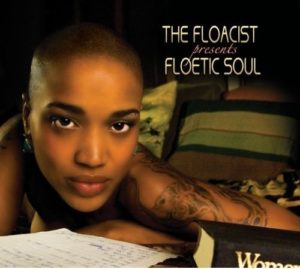When a group separates, it’s often over creative differences. While Floetry’s split was due, in large part, to the Floacist of the group’s feelings of evolution, as the members embark on their solo careers, the creative differences between the two have become magnified. The dynamic of the Neo-Soul sisters was so well-balanced that, in unison, you couldn’t imagine one without the other; but as both Marsha “The Songstress” Ambrosius and Natalie “The Floacist” Stewart prepare for the release of their solo debuts, it is becoming ever-apparent that it’s the Floacist that can’t quite flow without the tide of the songstress.
Stewart’s spoken word on the largely self-produced Floetic Soul, however, is refreshing when compared to the ingenuity of music’s most revered singers, songwriters and street poets. With her feminist verbiage, sexy innuendos, and breathy undertones, Stewart creates a sense of intimacy and depth missing from much of today’s music. Still, without the assistance of industry veterans Musiq Soulchild, MC Lyte, Raheem DeVaughn and Lalah Hathaway, Floetic Soul would be nothing but a collection of profound poetry with an astounding groove- and that’s alright too.
The first single, “Forever,” featuring Musiq Soulchild, is an eloquent love song that exposes the insecurities prevalent in many intimate relationships. Stewart is escorted by the organic sounds of the piano, while she exchanges whisper-soft evocations of love and commitment with Musiq. Stewart collaborates with another of her musical influences, Raheem DeVaughn, on the up-tempo, jazz-infused “Keep It Going.” The in-the-pocket groove ignited by the funk of the bass and electric guitars, and accompanied by DeVaughn’s soulful falsetto are what jump out at the listener, while Stewart’s intermittent affirmations become merely an afterthought, even in their depth. Sounding familiar?
Fans of Lalah Hathaway will appreciate the chemistry between her and Stewart on the soothing and sensual “Come Over.” The song is dripping with instrumentation, which completely subdues the listener. Here, Stewart’s ephemeral words shine bright enough not to be overshadowed by the musical composition or Hathaway’s mellifluous alto.
The album, staggered with hits and misses, scores another homerun with the album opener, “Breathe,” which serves as a blueprint for living a stress-free, joyful life. Stewart admonishes her peers to “Be mindful not to keep the residue of anything that had you feeling weak. Like, what was said versus what you think; sometimes your own assumptions are the things that make you sink.” She gives you the most basic form of spoken word over a repetitious beat, so as to not deter the listener from the weight of her message.
There are moments on Floetic Soul where the Floacist strikes out, and you can hear the crowd screaming for the other team member (Marsha Ambrosius), and the commentators condemn her for her decision to become a “free agent.” Songs like “You” and “What R U Looking For” pronounce her lackluster vocals, and thus emphasizes her need for musical features to create the balance found in her former musical counterpart. “What U Gonna Do” boasts a furrowing horn section over a smooth yet funky, piano-heavy track. Unfortunately, the amateurish repetition of the hook, coupled with Stewart’s cumbersome flow serve as a distraction from the groove of the song.
Stewart attempts to redeem herself on “The Stand,” an uplifting anthem for the dreamers out there. For the first time on the album, the Floacist masters her vocals; moving seamlessly between breathy rhymes and subtle adlibs. The static of the snare drum, dancing with the melodious piano keys, breathes life into Stewart’s words as she sings “Believe in yourself or who’s gonna? If you never dream for yourself then who’s gonna?”
Stewart may have seceded from her former group, but with Floetic Soul she continues on the path that once made Floetry trailblazers of this generation. Yet, the necessity of features to atone for what’s missing is a testament to the fact that, on its own, Stewart’s flow isn’t enough to carry a complete album. Still, the soulful production and organic vocals make Floetic Soul a worthwhile escape for those longing to revisit the days of Meshelle Ndegeocello, or the inception of the neo-soul movement.
01-ne-yo-champagne_life


 out of 5
out of 5
Follow Fawn Renee on Twitter @ http://twitter.com/fawn_renee
Follow Us on Twitter @ http://twitter.com/planetill
Join Us on the Planet Ill Facebook Group for more discussion
Follow us on Networked Blogs






2 thoughts on “Album Review: The Floacist-Floetic Soul”